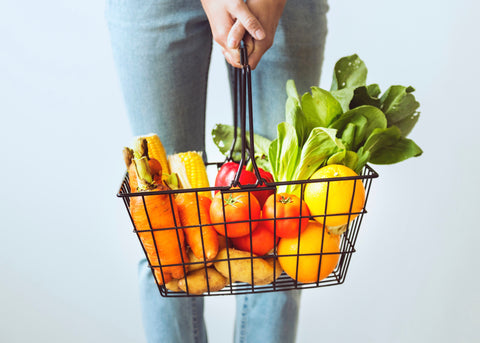Foods that help your body produce collagen naturally
Collagen is super trendy right now. From collagen protein powder to collagen supplements, it’s hard to go into your local health food store without seeing some sort of new collagen product. But, collagen isn’t exactly plant-based, and it definitely doesn’t fit into a vegan diet.
Collagen is made from the bones, skin, as well as cartilage of animals, which can really gross plant-based eaters out. However, here’s the thing. Collagen is actually good for us, and the body needs it, but that doesn’t mean we have to get it from animal sources.
We are breaking down why collagen is important. Plus, we’re sharing the top vegan foods that can actually help your body produce more collagen naturally, so you can ditch the idea of a collagen supplement altogether.

Why is Collagen Important
First, let’s talk about why collagen is even important for our health anyway. Collagen is the most abundant protein in the body, and your body can actually produce collagen on its own. However, the issue is that as we age, our body’s collagen production starts to take a steady nosedive.
Not having enough collagen in the body can lead to early signs of aging like wrinkled skin, weak hair, and nails, and can lead to less joint mobility, and brittle bones. None of these are things we want to deal with as we get older.

How to Increase Collagen Production With Plant-Based Food
So, while collagen is super important for overall health, us plant-based eaters aren’t too keen on adding bovine collagen to our daily shakes.
The good news is that since the body is able to produce collagen, there are certain nutrients that can help support an increase in collagen production in the body.
Without getting too much into the science of how collagen is made, what you need to know is that collagen starts off as procollagen. Procollagen is produced when glycine and proline (amino acids) are combined. The process of producing procollagen requires vitamin C.
This is where a plant-based diet can really supercharge your collagen production. Plant-based foods like fruits and veggies are loaded with nutrients like vitamin C. Not only that, but there are some plant-based foods that are also rich in the three amino acids (glycine, proline, lysine) that all play a role in the production of procollagen.
Here are the top plant-based foods that can help your body produce collagen.
Plant-Based Foods to Boost Collagen Production

#1 Vitamin C Rich Foods: Since vitamin C helps with the production of collagen, you can help your body produce collagen by eating lots of vitamin C-rich plant-based foods. Be sure to munch on lots of bell peppers, strawberries, broccoli, and citrus fruits.
#2 Plant-based Proline-Rich Foods: Proline is an important amino acid that plays a role in collagen production. You can pack in a healthy dose of proline by enjoying foods like asparagus, mushrooms, and cabbage.
#3 Plant-based Foods Rich in Glycine: Glycine is the second amino acid that plays a vital role in collagen production. Beans, nuts, and seeds are great sources of this amino acid.
#4 Foods Rich in Lysine: Lysine is the third amino acid that plays a role in supporting collagen production. Again, foods like legumes, nuts, and seeds are all great plant-based sources of this important amino acid.
#5 Let Veestro Do the Work: Choosing to eat plant-based means your meal prep time may be a little more time-intensive. The good news is that Veestro can help by literally doing the work for you. With Veestro’s meal delivery service, you can have plant-based foods delivered right to your door that can just be heated up and are ready for you to enjoy. And, Veestro’s meals like The Ultimate Veggie Wrap and Lentil Meatloaf happen to be great sources of vitamin C and the amino acids your body needs to naturally produce more collagen.

You Can Get Your Collagen in The Vegan Way
While the most popular way to pack in collagen these days is to add a scoop of bovine collagen to your daily smoothie or morning cup of joe, you can get your collagen in the plant-based way. By supporting your body with the amino acids it needs for natural collagen production, you can help support optimal collagen levels in your body all while supporting better health with plant-based superfoods.
And, don’t be surprised if vegan collagen finds its way onto grocery store shelves over the next couple of years. With the increased demand for plant-based options, it may just become the next “it” thing in the health and wellness scene.
For now, hold tight for true vegan collagen protein and amp up your intake of plant-based foods that can support the natural production of collagen in your body.

